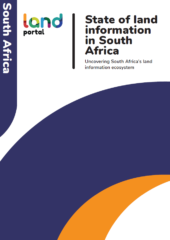
This State of Land Information in South Africa report provides an overview of existing data and information on key land issues. Its aim is to uncover the great diversity of land data and information sources in South Africa and thus provide a basis to substantiate, refute or nuance the often-repeated rhetoric that there is a lack of land data. The report was produced using an original scoping and assessment methodology that builds on recognized international frameworks.
The report systematically reviews and categorizes the entire landscape of data and information related to key land topics in South Africa, assessing over 104 land resources from 59 different sources. This robust scoping exercise demonstrates not only trends and gaps in land data collection, but led to very practical recommendations to improve visibility and usability of data and information, thus seeking to improve the land information ecosystem in the country.
Key findings of the report:
- 67% of key land resources are available as statistical or geospatial data, not documents.
- The government of South Africa is the main provider of data (over 60%).
- Perspectives from Civil Society account for only 8% of the total resources identified, suggesting that their data and information is not published in a way that makes it visible for a wider audience.
- While most land-related knowledge is published online in South Africa (97%) and is mostly available for free (75%), 40% of the resources identified have some kind of login barrier.
The report includes a range of recommendations for improving the land information ecosystem in South Africa, such as facilitating equitable access to data by removing login requirements or payment barriers, supporting and enforcing the use of standards when publishing data and metadata, applying open open licenses to published data and information and commissioning specific research and action into availability of data and information from civil society organizations to gain a further understanding in their data and information supplies as well as sharing practices, among others.
This is the fifth State of Land Information report produced by the Land Portal, which seeks to provide an overview of publicly available data and information on key land issues from government and other stakeholders in targeted countries. The aim of these reports is to uncover land data and information at the country level and help to identify data and information gaps, with a view to establishing a baseline for targeted ‘information-based’ interventions to improve the information ecosystem. Previous reports have been published on Kenya, South Sudan, Tanzania and Uganda.
To download the report (in English) / Téléchargez la publication : here/ici
